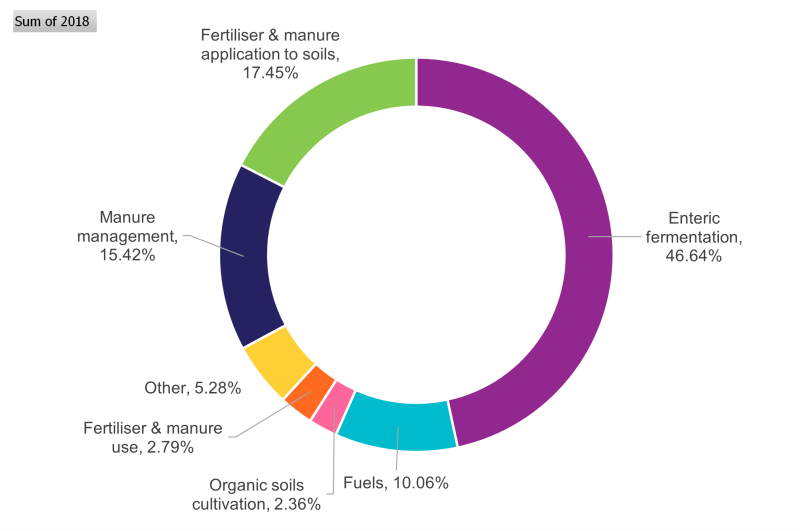7.1.1
UK agriculture
The majority of UK agricultural production is incorporated into products sold in UK retail.[83] The retail sector therefore has a strong shared interest in the farming sector meeting its 2040 net zero goal.[84] If this goal is not met, it will be challenging for the UK as a whole and the retail sector to meet its own net zero commitments. However, short supply chains and the potential for longer-term relationships with UK farmers and growers means that there is great scope for collaboration and shared investment in climate action.
Emissions profile
UK agricultural emissions are dominated by methane and nitrous oxide emissions from enteric fermentation, manure management and application of manures and inorganic fertilisers to soils (see Figure 7.1c below).

Figure 7.1c: Agricultural emissions in the UK. Note that emissions
embedded in feed production are excluded[85]
Routes to decarbonisation for UK agriculture
The routes to decarbonising UK agriculture have been summarised by the Committee on Climate Change and the farming sector (see 7.1d below). Some emissions, particularly methane from enteric fermentation in ruminant animals, are forecast to remain stubborn despite improvement measures, and these will need to be compensated by farmland carbon storage and other measures.[86] Initial priorities include a mix of productivity improvements plus the adoption of low carbon practices in technologies. The Committee on Climate Change estimate that related measures could contribute emissions reductions of more than 40 million tCO2e per year by 2050.[87]
|
Low carbon farming practices |
Forestry and Agro-forestry |
Peatlands |
Food loss and waste |
|
Precision farming Feed additives to reduce livestock methane emissions Improving livestock health Use of inhibitors and low carbon fertilisers Anaerobic digestion of manures and wastes |
Woodland creation Agroforestry practices |
Eliminate lowland peat extraction Use soil conservation measures on organic soils |
Prevent avoidable crop waste on farm |
Figure 7.1d: Key routes to decarbonising UK agriculture and land sector[88]
Some retailers have begun to take action within this sector, for example McDonald's has launched a "Sustainable MacFries Fund"[89] in partnership with McCain to improve the resilience of British potato farmers. The fund will provide £1m in grants to growers. Farmers will be educated and trained in improving soil structure while using new infiltration tines for ‘MacFry planters’. The technology will increase the uptake of water in both the soil and roots.
[83] Food statistics in your pocket 2017 – Global and UK supply (2018). Defra.
[84] NFU (2019) Achieving Net Zero Farming’s 2040 goal
[85] Based on data from national statistics: Final UK greenhouse gas emissions national statistics: 1990 to 2018. Please note, this data covers only emissions categorised as agricultural under the UK National Inventory. For instance, it excludes electricity use by the sector.
[86] NFU (2019) Achieving Net Zero Farming’s 2040 goal
[87] Committee on Climate Change (2020) Land use: Policies for a Net Zero UK
[88] Examples from Committee on Climate Change (2020) Land use: Policies for a Net Zero UK and NFU (2020) Achieving Net Zero Farming’s 2040 goal
[89] Sustainable MacFries fund: McDonald’s to invest in climate-friendly farming practices (Sept 2020) – edie.net